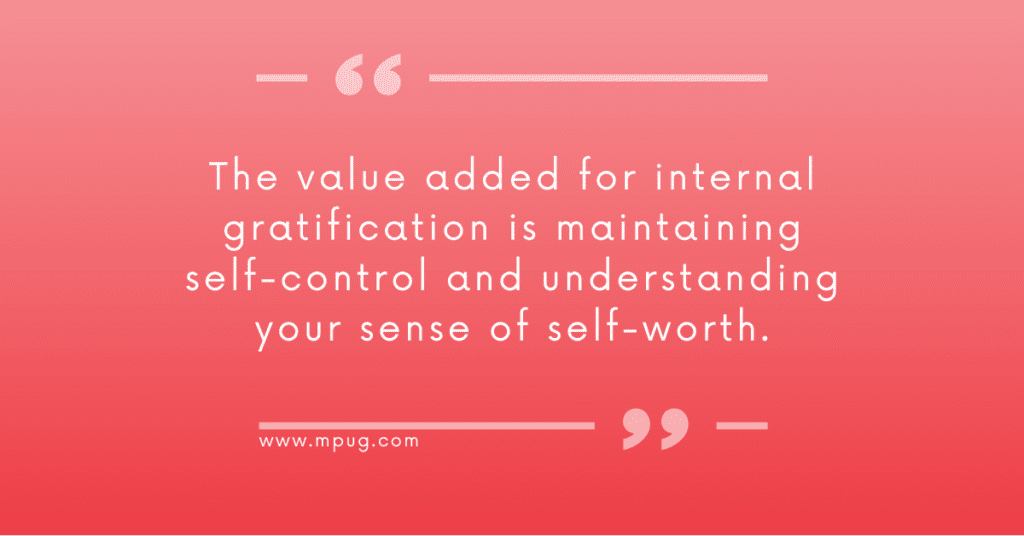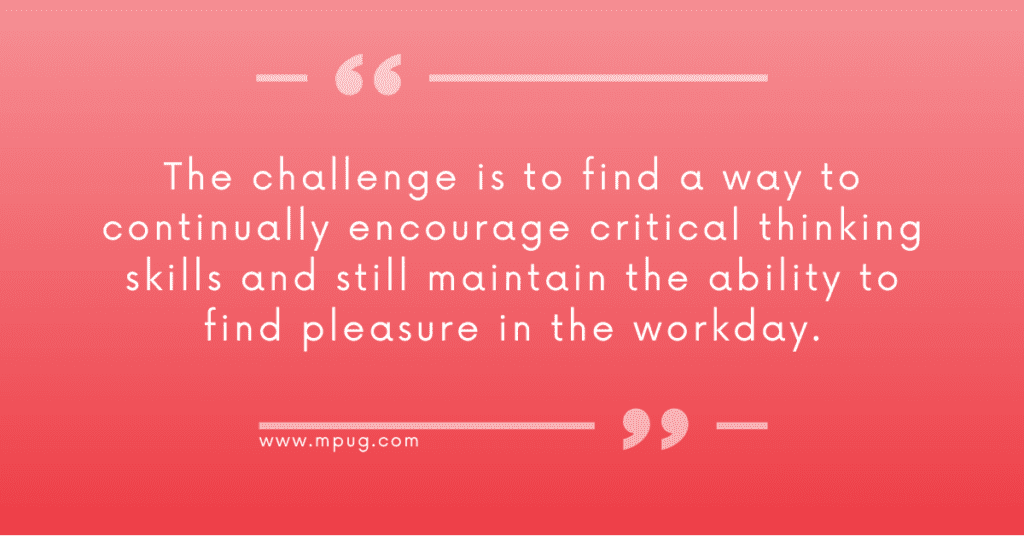
Understanding how instant gratification affects the way we work helps us to avoid behaviors that don’t serve us, and optimize habits and patterns that do. Let’s suppose you own a piece of property that is overgrown with branches and vines. One path crosses the property and allows you to walk quickly from one side to the other. This pathway is established, so it’s easy to take it every time instead of creating new paths that allow you to see more of your land and explore what it offers. The established pathways work similarly to the pathways in your brain.
How Instant Gratification Works
Your brain has electrical pathways that respond to actions you take. If you create a pleasure pathway in your brain that, for instance, chooses unhealthy snacks, you are more likely to follow that pathway. If you decide to avoid difficult situations, you will create a pathway that leads you to avoidance when your brain interprets a situation as conflict. You create instant gratification pathways that impact the actions you choose to take. These pathways affect the way you do business.
If you place a high value on this path of instant gratification, you are more likely to be distracted from longer-term, more consequential goals. So, the team member who avoids conflict to cope with stress will see decreased efficiency because the default behavior doesn’t support effective communication as you move a project forward. Or a person who yells at someone when there is a challenge may not strengthen the team because the focus is on the instant gratification of needing to express displeasure. This is why you often hear the advice of counting to ten before reacting. There is a higher probability of making choices that strengthen the team or the individual when instant gratification is exchanged for delayed gratification.
Downfalls of Instant Gratification Behaviors
As an example, you need a quick boost to your day, the idea of a candy bar sounds good to keep you going for the afternoon. One candy bar may not hurt you, but if your need becomes an instant gratification pathway, you may find yourself eating a candy bar every day, which will then cause a dip in your energy level after the initial sugar rush. You might even gain a little weight and feel sluggish for the rest of the day, but your candy bar pathway of instant gratification becomes so reinforcing that you find it hard to stop.
This behavior is also applicable to wanting reinforcement from people. You need more clarification about your work and ask your boss for help. They are supportive and helpful, which gives you a nice boost in your self-esteem. The instant boost in self-esteem becomes an instant gratification pathway to having your boss applaud you, and you find yourself more often asking your boss for help. Instant gratification becomes an external force that validates or gives you pleasure or validation.
Exchanging Instant Gratification for Delayed and Internal Gratification
There is a time and place for instant gratification, but there is value in considering the role of instant, delayed, and internal gratification in your choices. Delayed gratification gives you the opportunity to think of all your options before choosing the type of gratification that will drive your responses. Internal gratification comes from your belief in yourself, whereas instant gratification comes from seeking external comfort that immediately makes you feel better. Your choices will determine the way you find gratification. It also determines where fractures occur and where you might strengthen yourself and your relationships.
The challenge comes from keeping a one-time splurge in behavior from becoming a pleasure pathway reinforcer which will cause you to struggle with building your internal validation pathways.
Finding Sustainable and Strengthening Activities
Instant gratification is not the adversary but your ability to manage the need for instant gratification is key. When low self-esteem drives you to the instant gratification path, this need for a quick feeling of happiness can be exchanged for a strong sense of your internal value. With internal gratification, you find activities that are sustainable and strengthening. You walk instead of eating a candy bar when you need a quick boost in the afternoon. Fresh air and increased blood flow help you make it through the afternoon without the sugar rush or the drop in energy. The pathway is now bringing strength to your day.
The value added for internal gratification is maintaining self-control and understanding your sense of self-worth. Delayed gratification, by itself, is not the behavior that strengthens your resolve, but it allows you to practice the skill of waiting and understanding the bigger picture.

Benefits of Waiting
In the JSTOR Daily, Alexandra Samuel discussed the difference between instant and delayed gratification. While all that instant gratification may be convenient, she suggests it impacts a long-standing human virtue: the ability to wait. She proposed that waiting wasn’t necessarily a virtue; virtue is self-control, and your ability to wait shows just how much self-control you have. Waiting gives you time to think, restore, and create. This topic is especially important to consider, given the ongoing technological advances.
How Technology Affects Gratification
Technology is changing the way we view gratification. Technology supports your pathways of instant gratification. You don’t have to wait long for anything. Instant feedback on social media and instant delivery through Amazon have become the norm. As a society, we are learning to become more impatient when waiting for things.
We also see that there is a different way to work with the advancement of technology. In a recent conversation with Dr. Austin Perlmutter, a board-certified internal medicine physician, New York Times Bestselling Author, researcher, and investor in the health and wellness space, the topic of instant gratification and technology was discussed.
Dr. Perlmutter says, “The last decade has seen the development of a powerful paradox.
On the one hand, scientific study increasingly supports the role of mindfulness in physical and mental health promotion. Yet our society has moved progressively towards a state of mindless activity. The most significant example is that we now spend the vast majority of our waking minutes interacting with digital devices. One of the major drivers of this event is the ability of our digital devices to capture our attention and reinforce dopamine-based loops of instant gratification. The net outcome: we waste our time, money, and mental resources pursuing things that create momentary flickers of value in our brains. In the process, we lose sight of the activities that lead to meaning, purpose, and long-term satisfaction.”
This behavior path creates a perception of binary thinking where you can only be good or bad, or wrong or right. The challenge is to find a way to continually encourage critical thinking skills and still maintain the ability to find pleasure in the workday. But is also means we are changing the way we work.

Instant Gratification and Performance Reviews
According to a recent PeopleGoal article, almost 70% of the millennial workforce believes that annual performance reviews are outdated. Millennials don’t want to wait until the end of the year to hear where they are thriving and where they need to progress. With Millennials being the largest generation in the workforce, these views will start to shift workplace activities to accommodate our changing lifestyles. We become faster-moving and more immediate in our ability to interact with people and things.
How to Identify Instant Gratification Impacts in Your Workplace
Instant gratification will always play a role in our workplace, especially with these changing views. Here are some things to consider as you look at instant gratification in your workplace:
- How much does your team rely on instant gratification to complete a task?
- Does the ability to wait for something help you to handle challenging situations?
- Does internal gratification help individuals increase their sense of self-worth?
- How valuable is self-worth in the workplace?
- Can you change culture by shifting instant gratification to internal gratification skills?
- How does instant gratification fracture you and your team? (Conflict/Frustration)
- Can you access critical thinking skills more effectively when instant gratification is managed?
Finding the Balance
As you look at instant gratification’s role in your daily choices, think about your path and how you can find a balance of pleasure and productivity in the workplace. This balance is one of the keys to work and life contentment.
Learn More
Five Tips for Dealing with Conflict in Project Management
What Type of Conflict Do You Have In Your Workplace?
Check Out Your Culture: A Management Tool to See How Behavior Strengthens Culture





